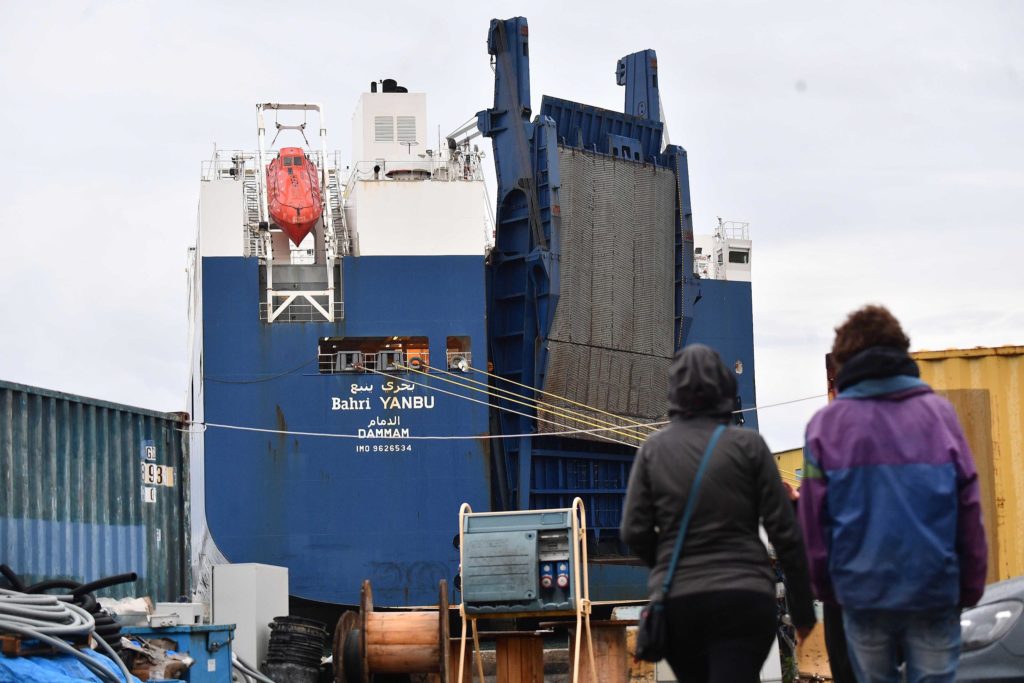Report
Italian dockworkers ‘close ports to war’
‘We are monitoring every passage of the Saudi ship, and it seems that it has cancelled its passage through Genoa in January. In February, however, we will be ready once again to block the docks with the help of the city, and we will ask the CGIL for another strike to stop these ships of death.’

“Close off our ports to war!” exhorts the leaflet put out by the Autonomous Collective of the Port Workers of Genoa, calling for a protest at the Prefecture of Genoa on Dec. 21, demanding that the city’s port bans shipments connected to the business of war.
Emergency, Amnesty International, Assemblea Contro La Guerra, Genoa Antifascista, Rifondazione Communista and other pacifist organizations in the city have joined the mobilization.
The dockworkers can make a big difference within the logistics sector of Genoa, as they did in June, when, with the support of the CGIL union, they prevented a ship owned by the Saudi Arabian shipment company Bahri from being loaded with supplies intended to fuel the war in Yemen—“the dirtiest and most criminal of the wars now in progress,” as the flyer reads.
The oil monarchies of the Gulf are among the top consumers—and the most barbarous users—of Western military technology, manufactured by US, European and Italian companies.
After the June blockade, the president of the Liguria Region, Giovanni Toti, objected to the protests, saying that “it’s absurd to not want these products to be shipped, while in Liguria many thousands of people are working for Fincantieri, which makes military ships and submarines, Leonardo, which makes radar systems and missiles, and Oto Melara, which makes naval cannons and armored vehicles.”
In November, the Pope himself might be said to have answered Toti’s argument (albeit indirectly), saying clearly that when those in positions of authority talk about peace while profiting from the arms trade, this is the typical “hypocrisy of those who produce weapons.” In particular, European countries “talk peace and they live for weapons.” Most importantly, he has said that the Genoa port workers “have done well.”
Moreover, the dockworkers of the Autonomous Collective also put forward their own response to Toti in the flyer announcing the protest: “We are not complicit in these dirty affairs. Not even if they are those of our state industry, such as Leonardo, which has chosen to put military production before civil production.”
It’s clear, however, that things have changed since June: on Dec. 12, when the Abha Bahri ship docked once again in Genoa, the Carabinieri and the DIGOS special forces were present at the gate and inside the terminal to protect the loading operations. On that occasion, the port workers made it known through a statement that “either war is kicked out of our port, or the consequences—primarily economic—will be felt by everyone. We are not willing to tolerate that a continuous and essential supply line for the war, and thus for causing death and misery to millions of people, should have a stop in Genoa on its route.”
We asked Rosario Carvelli, a member of the Collective and a delegate for FILT-CGIL, about how the workers intend to impose their demands on the government and port institutions. He answered: “We are monitoring every passage of the Saudi ship, and it seems that it has cancelled its passage through Genoa in January. In February, however, we will be ready once again to block the docks with the help of the city, and we will ask the CGIL for another strike to stop these ships of death. Our motto is ‘not one step back.’”
This struggle is gaining more and more visibility and support, since at the moment it is the only one that is showing in concrete terms that organized and determined workers are able to force the Saudi ships to change course, and could also alter the warmongering course of our country, which has a place in the global top 10 of arms sellers with Leonardo.
Of course, there are also internal disagreements among those who are taking part in the struggle: for instance, FIOM continues to maintain a dissenting position on Leonardo. At the same time, however, it is “thanks” to the Abha Bahri that the port workers of the Autonomous Collective are building networks of connections with their counterparts in Livorno and Naples and with other port workers across Europe, deciding on and enacting a strategy for action that goes far beyond the confines of the trade union struggle alone.
Originally published at https://ilmanifesto.it/chiudiamo-i-porti-alla-guerra/ on 2019-12-20
